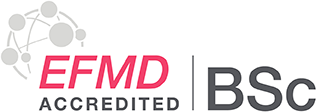Many situational factors cause us to be unethical
News

“Many situational factors cause us to be unethical” – Professor Dr. Chase Thiel about ethical leadership and its recent developments
Professor Dr. Chase Thiel from the University of Wyoming visited the Business School Pforzheim for the first time to teach a course on Ethical Leadership. In an interview with student reporter Simon Stolle, he talks about his personal connection to Germany, the challenges of ethical leadership, and how Covid-19 is challenging the concept of ethical leadership.
Dr. Thiel, it is your first time here in Pforzheim. What spots in the region or cities do you want to visit during your stay with us?
Part of my interest in this teaching agreement is my wife's relationship with Germany. Her grandparents emigrated from Erlangen in the 1950s after the second world war. She still has many cousins in Germany now, especially in Erlangen. So, I've been to Germany a couple of times now and we've visited Erlangen and Nuremberg before. We will travel to this region again, but also, we will visit some spots around here. Maybe some other cities like Frankfurt, Munich, and Regensburg will add to the list. And if we keep coming back, I'm sure we'll see the whole country.
As your field of research is – among others – ethical leadership: what should business administration/future business administration students know in this domain?
There are two things in my opinion. The first thing they need to know is that good people do bad things. We all say we're going to be ethical individuals in our professional lives, but many of us aren't. I'm sure the corporate leaders at Volkswagen who were caught up in their scandal a few years ago said “I'm going to practice business the right way” - they didn't. It's not because they're not people with values, and it's not because Volkswagen didn't have a corporate ethics statement, they have those. It's because we don't understand the psychology of ethics and the psychology of ethics is we often times don't process our values before we make ethical decisions. Instead, we act instinctively and many times our instinct is situationally bound. Meaning if it's something that's been part of our culture, to lie, to steal, to cheat, to a small degree, then we'll continue to do that, even if our values say not to do so.
The second and related thing is, that they need to be instinctively ethical. That only comes as you have a personalized, internalized code of ethics that you have thought about continuously and routinely, but you also practice being ethical. The more you process it, the more you prime your brain to be instinctively ethical instead of just assuming to be.'
How will the (ethical) leadership concept change within the next decades? Which aspects are getting more important?
There are two aspects again. One is, that people will have a better understanding that ethical leadership is about being proactive. Instead of just trying to be good yourself, you need to prepare your work environment to invite ethical behavior. That is because many situational factors cause us to be unethical. For example, a very common one is performance goals. Oftentimes, those performance goals, the way that they're designed, encourage unethical behavior. If a leader understands that, they should be proactive in setting up the goals so that they don't invite unethical behavior but encourage high performance.
The second thing is, that there is no good understanding and not even a proper conceptualization of what it means to be ethical. Ethical leadership is conceptualized as you have values you live by those values, you encourage other people to follow the ethics and norms of society – but what is that specifically? Does it mean to promote sustainability, to promote corporate advocacy, or social justice? I think within the next decades there's going to be more specificity around what ethical leaders should be doing specifically.
To what degree did the pandemic change the approach of ethical leadership?
COVID changed everything in organizational life and we're seeing organizations now rethinking. Today it is really about the question: What does work mean? – Does that mean you come in nine to five and you're at a desk? I think COVID has made us think about what ethical leaders should be about. It brought up very polarized views, for vaccines or against vaccines, for lockdowns or against lockdowns, etc. We're seeing more people fight in society and employees take sides. Therefore, ethical leadership now may include how to promote fairness in voice and encourage all employees to speak up.
You were – among other awards – rewarded the 2021 Wyoming College of Business Distinguished Teaching Award. What is your key insight of good lecturing you have gained that is most important?
You lecture less. And that's hard to do sometimes, but I feel like the best teaching is discussion-based. If you can get your students to engage with you in a back-and-forth discussion, you're going to be much more successful. Before you talk about what ethical leadership is, you provide a current event, for example, major corporate scandals we've seen over the last several years. That will allow students to better understand but also engage in discussion around it.
What is the most significant difference between the campus culture in the US and Germany you discovered so far?
What I know about European campuses, and I lived in Serbia for a couple of years, they're different in that a big part of campus culture in the United States is athletics. Every university has very popular sports programs, and people are very passionate about the school because of the athletics component. Here in Germany, this athletic culture is not that present, the universities are primarily for studying. I think because of that, there's a little bit different feel on campus. Students in Germany or Europe still spend time on campus, but their lives don't entirely revolve around campus. But I think on the flip side, there's much more earnestness to complete your degree on time in Europe.
Did you already catch some German vocabulary? If so, what are your favorite words?
My most used phrase is for sure: “Sprechen Sie English?”, so that I can get people to speak to me. Besides that, I think my favorite German words are German foods. As my wife is German, we have German food at home. Sauerkraut, for example, I love it.
Thank you very much, Professor Dr. Thiel.
The University of Wyoming is a public land-grant research university in Laramie, Wyoming, USA. Founded in 1886, it consists of seven colleges and offers over 120 undergraduate, graduate, and certificate programs. The College of Business is ranked among the top 5% of Business Schools worldwide and has about 1.300 students enrolled in its study programs.


